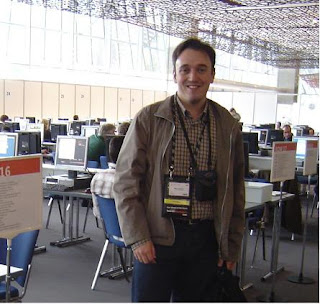TechEd 2006 Barcelona Session ScheduleIt's the final countdowns to TechEd 2006 in Barcelona. Right now, I'm packing up, because tomorrow I'm flying to Barcelona. The conferences only start on Tuesday, but from my company we're going the day before.
My tentative schedule, is somewhat like this (arranged by timeslot, and inside timeslot sorted by preference):
Tue Nov 7 11:30 - 12:45
DEV230 Developing Rich Web Applications with ASP.NET AJAX
DEV201 Introduction to the .NET Framework 3.0
Tue Nov 7 14:15 - 15:30
SQL408 SQL Server 2005: Advanced Indexing Strategies
ARC207 Introduction to Agile Methodologies and Concepts
DEV225 Windows Presentation Foundation (WPF): Introduction
Tue Nov 7 16:00 - 17:15
SQL409 SQL Server 2005: Advanced Indexing Strategies : Part 2
DEV347 ASP.NET AJAX Tips and Tricks
DEV223 Visual Studio: The .NET Language Integrated Query (LINQ) Framework Overview
ARC305 Connected Systems - Part 2: Communication, Flow, Rules and Logic
Tue Nov 7 17:45 - 19:00
OFF303 Visual Studio Tools for Office (VSTO) - Cypress and ORCAS
ARCWD03 Understanding Service Modeling Language (SML): The SML and Platform
DEV221 A Lap Around the New Enhancements for Web Developers in Visual Studio Orcas
DEV203 ADO.NET - Present and Future
Wed Nov 8 09:00 - 10:15 DEVWD15 Hardcore .NET Production Debugging
DEV349 ASP.NET: Developing Data-Driven Web Applications with .NET Language Integrated Query (DLINQ)
DEV323 C# 3.0: Future Directions in Language Innovation from Anders Hejlsberg
SQL402 Implementing the Service-Oriented Database Architecture (SODA) with SQL Server
Wed Nov 8 10:45 - 12:00
DEVWD03 Alternative .NET Debugging Facilities
SQL312 T-SQL Querying : Tips and Techniques
DEV217 Introducing Visual Studio (VS) 2005 Team Edition for Database Professionals
ARC304 Connected Systems - Part 3: Data and Transaction Management
Wed Nov 8 13:30 - 14:45
DEVWD12 Explore C# 3.0 with Anders Hejlsberg
DEV305 Garbage Collection - How to Make it Work for You
ARC301 Connected Systems - Part 4: Presentation and Interactivity
DEV002 DEMO: 10 Undiscovered features of ASP.NET 2.0
Wed Nov 8 15:15 - 16:30 DEV219 Using the Essential Unified Process with Visual Studio Team System (VSTS)
DEV315 Scalability, Reliability and Maintainability of Internet Information Services (IIS)-hosted Workflows
ARCWD02 Enterprise Library for .NET Framework 3.0
DEVWD28 Exploring New Functionality in Internet Explorer (IE) 7
Wed Nov 8 17:00 - 18:15
DEV317 Integrating the Visual Studio (VS) Team Edition for Database Professional into your Software Development Lifecycle
DEV325 Windows Vista: Tips & Tricks for Targeting Key Native Application Program Interfaces (APIs) from Managed Code
ARC201 Patterns and Anti-Patterns for Service-Oriented Architectures (SOA)
DEVWD18 Why is Essential Unified Process (EssUp) a Next Generation Process?
Cheeseman?
Thu Nov 9 09:00 - 10:15
DEV306 Using the .NET Language Integrated Query Framework with Relational Data
DEV345 Asynchronous ASP.NET Programming
DEV321 Delving into Visual Studio 2005 Team Edition for Software Developers
ARC307 Adding Value to Message-based SOAs with Workflow
Vista?
Thu Nov 9 10:45 - 12:00
DEV206 Common Language Runtime (CLR): IronPython and .NET Scripting Languages
DEV229 ASP.NET: End-to-End - Building a Complete Web Application using ASP.NET 2.0, Visual Studio 2005, and Internet Information Services (IIS) 7 (Part 1)
SQL403 Understanding Interactions of Transactions, Batches, Nested Procedures, MARS (Multiple Active Result Sets), and SQLCLR (Common Language Runtime) in SQL Server 2005
DEV308 Proven Practices for Implementing Services
ARC302 Connected Systems - Part 5: Identity and Access Management
Thu Nov 9 13:30 - 14:45
DEV227 Windows Presentation Foundation (WPF) in the Real World: Zürich Airport Monitoring System
DEVWD27 "Scripting ASP.NET AJAX": Deep Dive into ASP.NET AJAX, Scripting & Debugging
ARC205 Connected Systems - Part 6: The Future of the Microsoft Application Server Platform
SQL406 Developing SQL Server 2005 Analysis Services Powered Applications
Thu Nov 9 15:45 - 17:00 DEV243 Implementing Continuous Integration: With and Without Team System
DEVWD17 Team System Adoption Best Practices
DEV359 .NET Hidden Treasures
SQLWD04 The Query Governor: SQL CLR in Action
Thu Nov 9 17:30 - 18:45
DEV322 Unit Testing Best Practices With Visual Studio 2005 Team System
DEVWD24 Converting Existing ASP.NET Applications to Visual Studio 2005 Web Application Projects
SQL301 Coding SQL Server 2005: Plan Guides and Plan Forcing
ARC309 Security is a Feature - Best Practices for Designing Secure Distributed .NET Applications
Fri Nov 10 09:00 - 10:15 DEV403 Optimizing Performance and Scalability of Distributed .NET Applications
DEV360 Windows Powershell - Building Next Generation Command Line And GUI Applications On Windows
DEV338 Windows Vista for Managed Developers: Beyond NetFx3
DEVWD14 Test Driven Development: Myths and Misconceptions
DEV346 Attack and Defense: Securing ASP.NET 2.0 Applications
Fri Nov 10 10:45 - 12:00
ARC209 Microsoft Solutions Framework 4.0 Core and its Family
DEV405 BizTalk Server 2006 - Internals
SQLWD06 Best Practices for architecting Reporting Services Report Models for Ad-hoc Reporting
DEV218 Developing and Designing Standard Based Web Applications with Expression Web Designer
Fri Nov 10 13:30 - 14:45 SQL404 SQL Server 2005 Cache Sync/Query Notifications in Depth
DEV411 AJAX Patterns with the Microsoft AJAX Library
DEV004 DEMO: Technology in Action! Building a Distributed Solution with .NET Framework 3.0
SQLWD01 SQL Server Integration Services (SSIS) – The Top 10 Tips
ARC206 Abstract Concepts: Architecting Applications for a Service-Oriented World
Fri Nov 10 15:15 - 16:30
DEV319 Visual Studio 2005 – Advanced Data Access Techniques
DEV358 New Cryptography: Algorithms, APIs and Architecture
DEV366 Boost Your Data-Driven Application Development Using SQL Server Centric .NET Code Generator [OlyMars Refresh]
DEVWD25 IIS 6.0 Programming Interfaces and Architectural Drill Down
Planning to learn some interesting stuff, either new or very specialized. From my schedule, it's obvious that my main interests are Architecture, SQL, Development.
